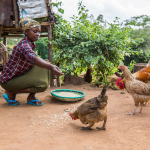Annual Letter

Annual Letter 2023
Here you can download assets related to the 2023 Annual Letter. Credit and caption info is located in the description of each. The 2023 Annual Letter is strictly embargoed until 12:01am ET on January 17, 2023. Media inquiries: Media@gatesfoundation.org
Open »
2015 Gates Annual Letter Video Clips and PDF…
Video clips of Bill and Melinda Gates discussing…
Bill and Melinda Gates discuss France's role in global development
Open »
2014 Bill and Melinda Gates Annual Letter
Today, Bill and Melinda will share their co-authored 2014 Annual Letter. This year’s letter, “Three Myths that Block Progress for the Poor,” addresses three misconceptions about the global effort to end extreme poverty: Poor countries are doomed to stay poor, foreign aid is a big waste, and saving lives leads to overpopulation. In fact, life is better for more people around the world than it has ever been. People are living longer, healthier lives and poverty rates have been cut in half in the last 25 years. Child mortality is plunging. Many nations that were aid recipients are now self-sufficient. Bill and Melinda want to tackle these myths because too often they give people a reason not to act. Read the letter and find out what Bill’s prediction for 2035 is here: www.gatesletter.com For all media inquiries, please contact media@gatesfoundation.org or +1-206-709-3400 http://annualletter.gatesfoundation.org/
Open »Annual Letter

2015 Gates Annual Letter Video Clips and PDF…
Video clips of Bill and Melinda Gates discussing…
Bill and Melinda Gates discuss the role of countries in the Middle East in global development and addressing poverty around the world.
Open »
2015 Gates Annual Letter Video Clips and…
Video clips of Bill and Melinda Gates discussing…
Bill and Melinda Gates discuss India's role in global development.
Open »
2015 Gates Annual Letter Video Clips and PDF…
Video clips of Bill and Melinda Gates discussing…
Bill and Melinda Gates discuss Germany's role in global development.
Open »
2015 Gates Annual Letter Video Clips for…
Video clips of Bill and Melinda Gates discussing…
Bill and Melinda Gates discuss the Europe's role in global development.
Open »
2015 Gates Annual Letter Video Clips and PDF…
Video clips of Bill and Melinda Gates discussing…
Bill and Melinda Gates discuss China's role in global development
Open »
2015 Gates Annual Letter Video Clips for UK…
Video clips of Bill and Melinda Gates discussing…
Bill and Melinda Gates discuss the United Kingdom's role in global development.
Open »
2015 Gates Annual Letter Breakthrough Four:…
Better software will revolutionize the future
Last fall, Bill met a number of students in Arizona who are getting their college degrees through online schools. One of them told him how he had struggled in a traditional school—and how learning online made it much easier to balance school and work.Yet if we went to a poor country and asked a street vendor about taking online classes, she would just laugh. The idea would seem ridiculous. But it shouldn’t. And one day, it won’t.
Open »
2015 Gates Annual Letter Breakthrough Three:…
By 2030, Mobile Banking will help the poor…
The financial lives of the poor are very complicated. The Kenya Financial Diaries, a project documenting the financial lives of hundreds of Kenyans over the course of a year, tells countless stories of people who had to forgo medical care or take their children out of school for want of a few dollars.
Open »
2015 Gates Annual Letter Breakthrough Two:…
By 2030, Africa will be able to feed itself
Seven out of ten people living in sub-Saharan Africa are farmers. (Compare that to the United States, where the ratio is two out of a hundred.) And yet Africa has to rely on imports and food aid to feed itself. Though it’s the poorest continent in the world, it spends about $50 billion a year buying food from rich countries.
Open »
2015 Gates Annual Letter Breakthrough One:…
Child deaths will go down by half, and more…
Until recently, the world was split in two. In one half, virtually all children were vaccinated, had sufficient nutrition, and received proper treatment for common illnesses like diarrhea and pneumonia. The number of children in this half who died before they reached the age of 5 was well under 1 percent. Then there was the other half.
Open »
2015 Gates Annual Letter
To read the full letter please go to www…
This site is intended for use by journalists to access photo and video assets for editorial use. Media Note: Please Direct all story links to www.gatesletter.com
Open »

